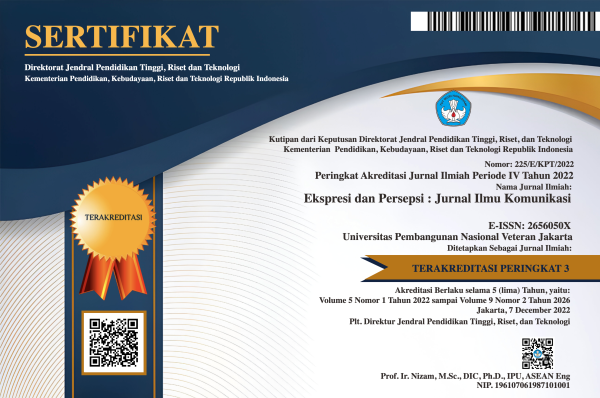PHENOMENON OF FANDOM WAR IN K-POP COMMUNITY ON SOCIAL MEDIA
DOI:
https://doi.org/10.33822/jep.v6i2.5808Keywords:
fans, fanwar, kpop, social mediaAbstract
This research aims to discuss the phenomenon of fan wars between fans of a K-pop group and fans of other K-pop groups. Furthermore, it explores the reasons and purposes of this incident among K-pop fans, using the observation method based on Stuart Hall's Encoding-Decoding theory. This research will analyze several fan war cases that occurred some time ago. The results of this study indicate that the fan war phenomenon has several ways, like replying to each other's comments on social media using insulting and harsh words commonly known as flaming, making tweets that bring down idols from other fans, and making videos containing hoax news. The interference of toxic fans from each fandom is the reason this fan war can happen, and the selfish nature of each fan who wants to show their prowess to other fans is their main goal. Ultimately, this phenomenon is just a form of selfishness from every fan toward their idol.
References
Bourdieu, P. (1984). Distinction: A Social Critique of the Judgment of Taste (trans. Richard Nice). Harvard University Press.
Giles, D. C. (2013). The Extended Self Strikes Back: Morrissey Fans’ Reaction to Public Rejection by Their Idol. Popular Communication, 11(2). https://doi.org/10.1080/15405702.2013.779501
Hall, S. (1973). 10 Encoding / decoding *. Encoding and Decoding in Television Discourse, 7.
Jenkins, H., & Carpentier, N. (2013). Theorizing participatory intensities. Convergence: The International Journal of Research into New Media Technologies, 19(3). https://doi.org/10.1177/1354856513482090
Kim, J. O. (2015). Reshaped, reconnected and redefined: Media portrayals of Korean pop idol fandom in Korea. The Journal of Fandom Studies, 3(1). https://doi.org/10.1386/jfs.3.1.79_1
Murdock, G. (2017). Encoding and Decoding. The International Encyclopedia of Media Effects.
Sandvoss, C. (2005). Fans: The Mirror of Consumption. Polity Press.
Sihombing, L. H. (2018). Pengaruh Kpop bagi Penggemarnya: sebuah analisis kajian blog. Makna: Jurnal Kajian Komunikasi, Bahasa, dan Budaya, 3(1), 55-76.
Simmons, B. (2009). The Book of Basketball: The NBA According to the Sports Guy. ESPN Books.
Sullivan, J. L. (2022). Media Audiences: Effects, Users, Institutions, and Power. In Media Audiences: Effects, Users, Institutions, and Power. https://doi.org/10.4135/9781071872406
Wolfreys, Julian, R. R. and K. W. (2006). Key Concepts in Literary Theory. 2nd Edition. Edinburgh University Press.
Wolny, R. W. (2017). Hyperreality and Simulacrum: Jean Baudrillard and European Postmodernism. European Journal of Interdisciplinary Studies, 8(1). https://doi.org/10.26417/ejis.v8i1.p76-80
Zhao, J. (2014). The Theoretical Research on Stuart Hall’s “Encoding and Decoding.” Guangxi Normal University.
Downloads
Published
Issue
Section
License
Copyright (c) 2023 Aldy Marcelino Letwory, Lambok Hermanto Sihombing

This work is licensed under a Creative Commons Attribution-NonCommercial 4.0 International License.














